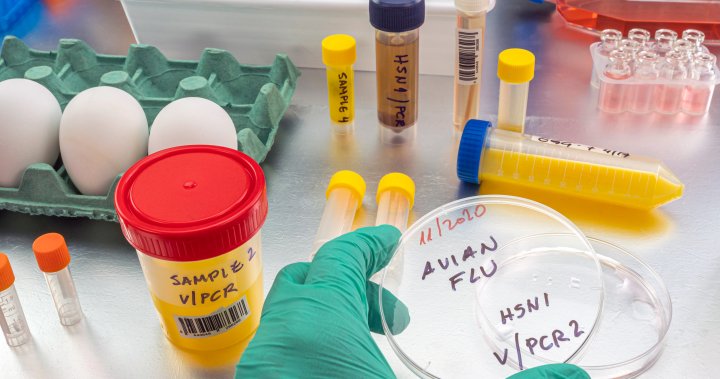As the bird flu outbreak continues spreading south of the border, Canadian officials are in talks with several pharmaceutical companies about potential agreements to produce an avian flu vaccine for humans.
There is no avian influenza vaccine available in Canada for public use, according to Health Canada’s website. Canada is also not currently stockpiling human avian flu vaccines, but this could change in the future, according to federal health officials.
“The Public Health Agency of Canada (PHAC) has proactively met with pandemic influenza vaccine suppliers (e.g., GSK, Seqirus and Sanofi) with whom we have an agreement for domestic or off-shore vaccine manufacturing to discuss pandemic influenza vaccine preparedness activities in order to inform steps that could be taken against avian influenza,” a PHAC spokesperson told Global News in a Friday email.
“These activities include obtaining an H5N1 candidate vaccine virus, and the possibility of producing pre-pandemic vaccine if and when production capacity is freed up from producing the seasonal influenza vaccines.”
The bird flu virus has been spreading among more animal species in scores of countries since 2020. It was detected in U.S. dairy herds in March, and since then at least three people — all workers at farms with infected cows — have been diagnosed with bird flu, although the illnesses were considered mild.
But earlier versions of the same H5N1 flu virus have been highly lethal to humans in other parts of the world. Officials are taking steps to be prepared if the virus mutates in a way that makes it more deadly or enables it to spread more easily from person to person.
While it is rare for the virus to spread to humans, experts warn that it could mutate and become more transmissible, posing a significant health threat due to its potential lethality.
“The bird flu has surprised us over and over and over,” said Kerry Bowman, a professor of bioethics and global health at the University of Toronto. “People didn’t predict it would jump to mammals and that mammals would give it to each other. But then look what happened.”
Canada has increased its surveillance of bird flu in dairy cows and milk. As of May 24, the Canadian Food Inspection Agency (CFIA) has also confirmed that Canada’s milk supply remains free of avian flu fragments after testing came back negative.
Although the risk may be low, and the virus has not been detected in Canada, experts like Maxwell Smith, a bioethicist at Western University in London, Ont., believe it’s never too early to start preparing for a potential bird flu pandemic.
“It’s much easier and much preferable to intervene now, even though the risk is very low at the present moment for transmission into humans, ” he told Global News.
“Even though we will have to spend some resources now and make a little bit of an investment and think about these questions, it’s far better doing that now than having to address the questions that will emerge if there were a human-based pandemic of H5n1.”

‘We need to have vaccines’
A lesson learned from the COVID-19 pandemic is that we never want to be too late in preparing for a potential pandemic, warned Dr. Shayan Sharif, an avian immunologist and associate vice president of research at the University of Guelph.
“Should we be thinking about [vaccines]? Yes, absolutely. It’s always good to be prepared,” he said. “The virus is not a pandemic at the moment, and we want to make sure that it would never become a pandemic. But if it does, then we need to have vaccines, and vaccines would need to be tested for their safety and for their efficacy. And all of those things would take some time, and we want to be prepared for that possibility.”
He added that while it takes time to distribute doses within Canada if we have learned anything from the COVID-19 pandemic, it is that vaccinating people in one country alone is not sufficient to eradicate the disease.
The latest health and medical news
emailed to you every Sunday.
“You have to have global endeavors to vaccinate almost everyone on the face of the planet. So we need to have plans in place for not only vaccinating Canadians, but also vaccinating the entire world,” Sharif said.
Bowman mentioned that Canada has the infrastructure to manufacture these vaccines but is not activating it at this time.
One reason, he highlighted, is that doing so would disrupt the production of seasonal influenza vaccines for the 2024 and 2025 seasons, which is crucial for Canadians.
“If we go into high gear with mass production, it’s going to knock out the preparation for the flu vaccines for, late 24 into 25,” Bowman said. “We won’t have the capacity [for both].”
Another hurdle with vaccines is ensuring they are made with the current strain of H5N1, which could mutate again. Similar to the influenza virus, bird flu viruses are capable of rapid genetic changes through mutations.

Where do other countries stand?
The U.S. government has a stockpile of H5N1 vaccines and has partnerships with three pharmaceutical companies: GSK, CSL Seqirus and Sanofi. These companies have seasonal influenza production capacity and say they would be able to scale up production of avian flu vaccines if needed, according to the Associated Press.
On May 30, CSL Seqirus announced that it was in the works to manufacture and deliver around 4.8 million doses of pre-pandemic vaccine that is “well-matched to the H5 of the currently circulating H5N1 strain.” It is estimated to be complete in the late summer of 2024.
CSL Seqirus, located in North Carolina, manufactures an FDA-approved cell-based H5N1 vaccine called Audenz.
And the pharmaceutical company Moderna already has a bird flu mRNA vaccine in very early-stage human testing. In a statement, Moderna confirmed that “we are in discussions with the U.S. government on advancing our pandemic flu candidate,” the Associated Press reported.
These messenger RNA vaccines are made using a small section of genetic material from the virus. The genetic blueprint is designed to teach the body how to make a protein used to build immunity.
Similar work has been going on at Pfizer. Company researchers in December gave human volunteers an mRNA vaccine against a bird flu strain that’s similar to — but not exactly the same as — the one in cows. Since then, researchers have performed a lab experiment exposing blood samples from those volunteers to the strain seen in dairy farms, and saw a notable increase in antibody responses, Pfizer told the Associated Press.

Billions of vaccines could be produced, WHO says
In the event of a bird flu pandemic, the World Health Organization (WHO) has stated that it is on standby, ready to trigger and ramp up vaccine production for the virus.
Speaking at a media conference on May 8, Dr. Maria Van Kerkhove, director of pandemic preparedness with the WHO, said although there has not been any human-to-human transmission of the H5N1 virus, there is a system in place.
“And through those systems, there’s an ongoing risk assessment of the viruses, looking at the viruses themselves, the different mutations, the characteristics of those viruses. And through that system, there are candidate vaccine viruses that are recommended to be considered for production,” she explained.
“Within that system, we have two that are H5N1 viruses that could be used to ramp up vaccine production. We have not triggered that system yet.”
However, she added that the WHO has access to real-time production of these bird flu vaccines. If production is triggered, there there are “billions of vaccines that could be produced within the first year if necessary, based on the manufacturing technologies that we have. “
When asked why vaccines aren’t available now, Dr. Michael Ryan, who leads the WHO’s response to disease outbreaks, explained that while vaccine candidates are in place, it’s imperative that they work against the current strain.
He added that producing billions of bird flu vaccines would hinder the production of influenza vaccines.
“We produce hundreds of millions of seasonal flu vaccines every year that we would have to switch production. So it’s not you can just press the button will begin producing pandemic H5 vaccines. You have to stop producing your seasonal vaccine.” Ryan said. “This requires a very careful consideration.”
— with files from the Associated Press





